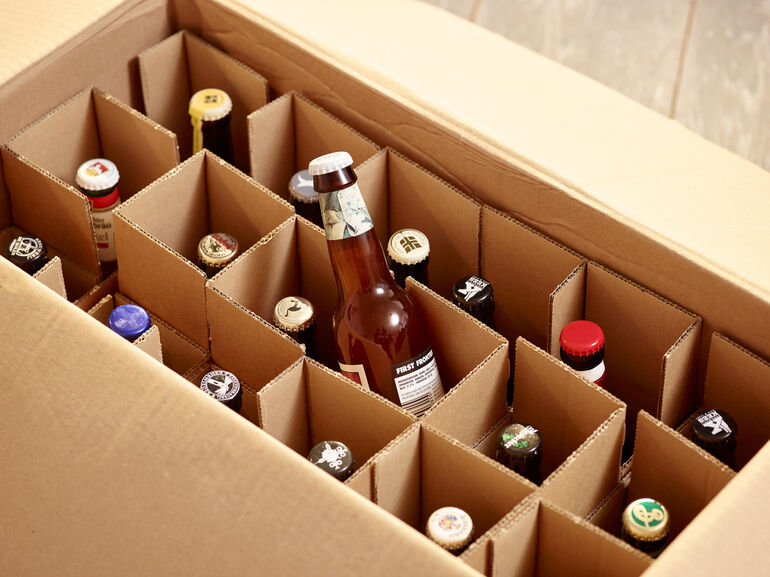Start 14-Day Trial Subscription
*No credit card required

Beer Shipping Laws Deconstructed
Beer shipping laws are inscrutable at best and completely opaque at worst. Why are they so confusing? We hope to clear up some misconceptions in this piece.
With the passage of the 21st Amendment in 1933 ending Prohibition, states (and in some cases, municipalities and counties) were given absolute power to enact their own laws regarding the production, distribution and sale of alcohol. It’s common knowledge that alcohol is highly regulated through every phase of its production, and its marketing and distribution must comply with a host of rules and regulations regarding how businesses can distribute their products – including how they are shipped.
Shipping Beer Between States
While all states allow the production of beer, the laws surrounding the shipment of alcohol vary from state-to-state. A handful of states allow shipments into and out of the state, while some only permit shipments from breweries within the state. Others restrict sending beer from breweries in-state but allow beers to be sent out of state, and still more only allow shipments sent out of state. There is little to no consistency on these states’ decisions, and requirements are often vague, convoluted and unclear.
Looking for a breakage-proof way to send your precious cargo? The gentlemen over at thirstybastards.com have developed a method for shipping beer that can survive a ten-foot drop.
Currently there are only 7 states – Nebraska, New Hampshire, North Dakota, Ohio, Oregon, Vermont and Virginia (and the District of Columbia) – that allow direct shipment from a brewery to a consumer. This means that breweries within these states are allowed to ship directly to consumers, and breweries from outside these states are allowed to ship directly to consumers within these states. There are 10 states that allow out-of-state retailers to ship directly to consumers. When beer crosses state borders, one must take into consideration the laws for both the shipping state and the receiving state.
Who Can Ship Beer?
As part of the three-tier system, only licensed wholesalers may distribute beer, and only licensed retailers can sell it to consumers. The United States Postal Service strictly bans the mailing or shipping of any alcoholic beverage anywhere, although some individuals mail products on the sly by labeling the shipment as something other than alcohol such as "yeast samples in aqueous solution."
There are only two legal ways to ship alcohol in the United States: A retailer must be licensed to sell alcohol by a state that permits shipments in and out of that state, and they must also have an alcohol shipper’s contract with a shipping company such as UPS or FedEx, both of which will ship to states where it is legal and with a required signature from an adult over 21 years of age accepting the package. Officially, as stated in their guidelines, both of the major carriers also will only ship beer from one business to another business and not to consumers, but interestingly, as of July 31, 2017, shipping beer internationally to consumers in several other countries is now allowed by UPS.
Since direct shipping of beer within the U.S. from producers/suppliers to consumers remains prohibited without a process for permitting the shipment of beer directly, private individuals who mail beer through the U.S. Postal Service risk the package being seized and receiving a first offense warning with subsequent offenses resulting in a possible fine or jail time. If shipping through FedEx or UPS, one is only violating the company’s policy, so no criminal punishment would be at risk.
Sound convoluted and perplexing? A company that is trying to sort out the confusion is Compliant Bootlegger (www.compliantbootlegger.com), an organization that is informed on the laws of each state to provide its customers with application assistance so that they are in compliance with laws regarding the manufacture, import or sales of alcoholic beverages. Compliant Bootlegger Founder/CEO Janeiro Cathey says, “As far as the laws themselves, it’s pretty black and white. The complication comes when comparing the states themselves, but each state law is pretty concrete.” Janeiro relates that the first step is obtaining a state license, but before an individual or business does so it must first deal with the Alcohol and Tobacco Tax and Trade Bureau. After receiving a permit, the business must then get licensed in its home state to manufacture or sell wholesale or retail.
Is beer treated the same as wine?
Beer is produced everywhere, and the number of breweries in the U.S. is at a historic high of 5,562, according to the Brewers Association. Wine production, on the other hand, is concentrated in a select few states, such as California, Oregon, Washington and New York. Consequently, several states have shipping laws more favorable to wine, granting out-of-state wineries permission to ship their wine directly to the consumer so that they can experience certain wine regions.
Further bolstering wine’s case was the 2005 decision in Granholm v. Heald, in which the Supreme Court ruled in favor of shipping wine directly to consumers across state lines. Though this ruling was specific to wineries shipping directly to out-of-state consumers, and applied specifically to New York and Michigan, it set a precedent for other states and the shipment of wine in general. Following the ruling, other states have modified their laws to accommodate this precedent. Further discrimination against beer in favor of wine is the fact that, as mentioned previously, UPS and FedEx will only ship beer from and to licensed businesses, but chooses to allow the shipment of wine to consumers nationwide.
What about cannabis?
The (legal) shipment of marijuana is still in its infancy. Perhaps leading the way is California, which has a licensing portal set up for Retailer, Retailer (non-storefront), Distributor, Distributor Transport, Microbusiness and Testing Laboratory (Cannabis.ca.gov). This may suggest the cannabis industry is looking to mimic the three-tier system that is set up in the alcohol industry. A major difficulty will reside in the fact that it is still listed as a Schedule 1 drug federally and not all states have legalized marijuana medicinally or recreationally. But that has been quickly changing, with 29 states currently allowing medicinal cannabis, and 8 states and D.C. legalizing recreational cannabis.
Beer of the Month Clubs
A quick internet search will lead to numerous beer clubs and other marketers offering to deliver beer directly to your door, and the majority of them will deliver to nearly all states with the exception of Utah, which prohibits alcohol shipments via UPS, FedEx or any other delivery service. One beer club informed me that they follow the individual state laws and ship to all states with the exception of Alabama, Kentucky, Mississippi and Utah; and another told me in some states they use smaller carriers other than UPS or FedEx. On its website, beer store Tavour states it only ships to AZ, CA, CO, CT, DC, MA, NE, NM, NV, OH, OR, WA and WI. There are numerous other clubs that list shipments to all states except Utah, even though several of the states legally do not permit shipping. So how do the clubs get around the legalities?
Don’t Ask, Don’t Tell
Despite confusing laws and carrier policies that generally don’t allow it, retailers ship to consumers anyway, and outside of a few exceptions, there appears to be a “don’t ask, don’t tell” mentality as shippers routinely label the container as wine instead of beer. (As a member of the media, I frequently receive samples from breweries, and in each and every instance the package is labeled as wine.) The shipping liability does not rest with the receiver, but rather with a vendor or retailer. If they lose their carrier shipping contract or lose their license as a result of violating state shipping laws, a new one can take their place and plug back into the network, thus creating the opportunity for third-party marketing companies to bypass the legal risk associated with direct shipment to consumers by passing it on to the individual vendors.
It’s worth noting that laws are constantly changing and some states, such as Pennsylvania, have loosened restrictions in recent years. Though it is unfortunate that the Granholm v. Heald Supreme Court ruling in 2005 only applied to wine, and while there is no common-sense explanation to justify treating one type of alcohol more favorably than another, it does show that progress can be made.
One hopes in the coming years that similar action will be taken to lessen restrictions on shipping beer and put it on an equal footing with wine, but a disadvantage for beer is that it does not have the lobbying power that wine currently does.



